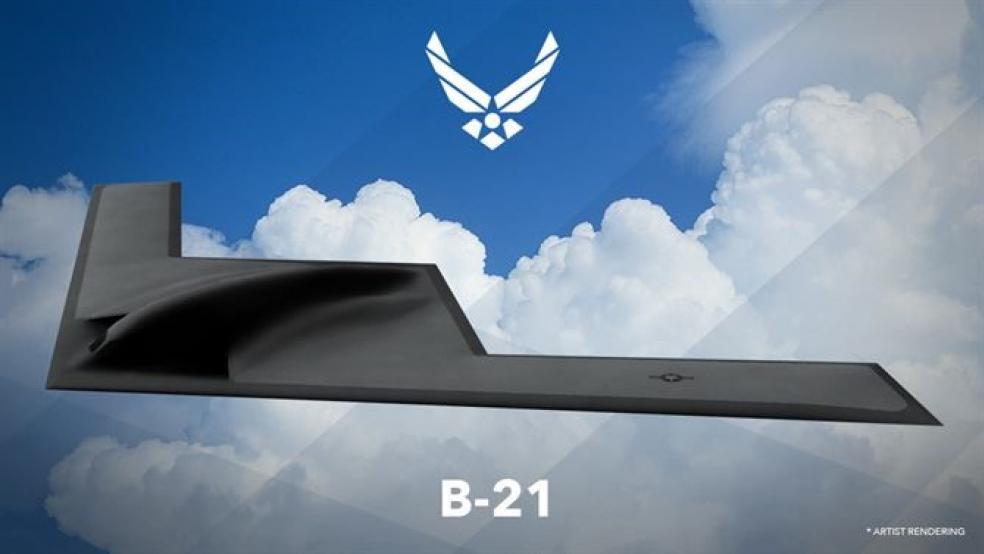The U.S. Air Force’s next-generation bomber made major strides this week, getting a new designation and avoiding a crippling legal battle, but it could still face serious opposition from a powerful lawmaker on Capitol Hill.
On Friday, Air Force Secretary Deborah Lee James announced that the aircraft, known until now as the Long Range Strike Bomber (LRSB), would henceforth be known as the B-21, in line with the service’s existing bomber fleet of B-1s, B-2s and B-52s.
Related: How the Air Force’s New Planes Could Bankrupt the Pentagon
The designation B-21 recognizes the LRSB as the first bomber of the 21st century, the service said in a statement that included the long-awaited first image of the aircraft. The bomber will receive a formal name this fall, according to James.
The Air Force hopes to purchase 100 new bombers, which are expected to cost around $560 million per plane. Add the cost of development, lifetime maintenance, unforeseen changes and upgrades and typically bad budgeting by the Defense Department and the program’s price tag could easily swell to more than $100 billion over the next several decades.
Related: The $400 Billion F-35 Still Faces Hundreds of ‘Deficiencies’
Work on the project came to a halt when the Air Force issued a work-stop order to contractor Northrop Grumman on Nov. 6 after a Lockheed Martin-Boeing team filed a protest with the Government Accountability Office (GAO) about the selection process for the high-tech warplane.
GAO tossed out the protest last week, allowing work to resume, and Bloomberg reported on Thursday that the Lockheed-Boeing duo wouldn’t sue in federal court to have the award decision reversed, another key win for Northrop.
However, it’s not all blue skies for the newly-designated B-21.
Senate Armed Services Committee chair John McCain (R-AZ) on Thursday warned he would not authorize the bomber program if the Air Force stuck with “cost-plus” contract for its development phase.
A cost-plus contract is an agreement in which a contractor is reimbursed for the costs incurred and is paid an agreed upon percentage of such costs as contractor's profit.
Related: Here’s the New, Secret Warplane Everyone Will Soon Be Talking About
“My biggest concern is the cost-plus provision in the contract. I will not stand for cost-plus contracts. They will say it’s because they’re not sure of some of the things they need in the development stage," McCain said Thursday during a roundtable with reporters, according to DefenseNews. "Fine, then don’t bid on it until you do know. If you have a cost-plus contract, tell me one time that there hasn’t been additional costs, then I would reconsider. The mindset in the Pentagon that still somehow these are still acceptable is infuriating.”
The Armed Services panel is responsible for crafting the annual national defense authorization act (NDAA). The massive bill serves as a policy roadmap for all Pentagon programs and efforts. If lawmakers leave out the bomber program, it could prompt appropriators to follow suit, basically delaying the project and sending shockwaves through the Air Force’s timeline.
However, McCain’s House counterpart, Rep. Mac Thornberry (R-TX), told the newspaper he didn’t plan to take such a hard-nosed stance when his committee crafts its own version of the NDAA, which would ultimately be conferenced with the Senate draft.
But the Arizona senator’s anger over the program could mean more turbulence for the bomber program going forward.
Already under a microscope because of the B-21’s enormous price tag, and its history of letting costs for big ticket items like the F-35 Joint Strike Fighter spiral out of control, Air Force officials should probably come to grips with the idea that they will have to defend the effort for years to come.





